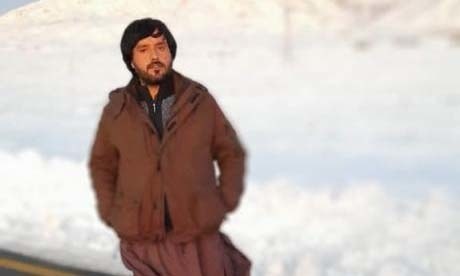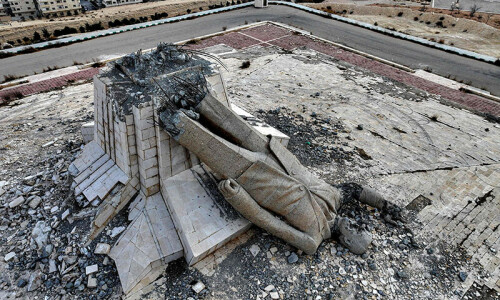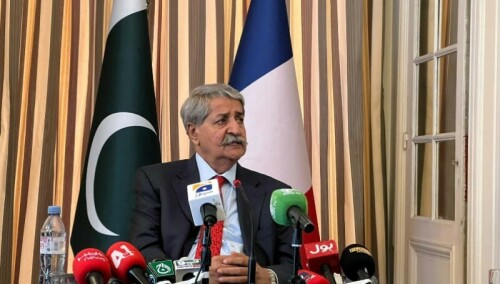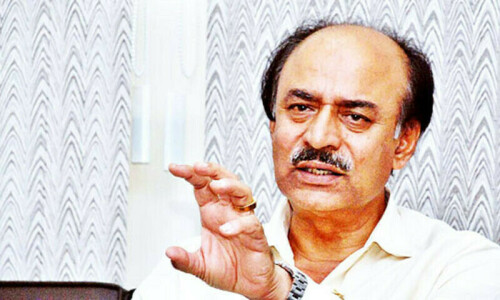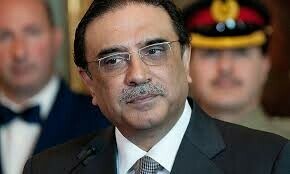LET’S take a break from the usual doom-mongering (however justified) and cynicism (however easily it comes) to celebrate the good among us. With an extreme winter upon us, thousands across the country are suffering and when heavy snows forced the Quetta-Zhob highway to shut down, hundreds of cars were left stranded in the freezing cold.
With overtaxed government rescue services not yet at the scene, these passengers faced an uncertain fate and many may have ended up badly had it not been for a local hero named Suleman Khan. Hailing from Kuchlak, this young man went out in his land cruiser with his brother Noman and, armed with a tow cable and courage, set out to rescue those trapped in the snow.
Over 100 people have been saved by Suleman, his brother and their SUV, and many of those were ferried to his own house where they were kept warm and fed. There was a system in place, and Suleman prioritised rescuing pregnant women, elderly people, children and patients.
For those who were capable of making it on their own, Suleman simply towed their cars out of the deep snow and even gave them money for fuel out of his own pocket.
Over 100 people have been saved by Suleman, his brother and their SUV.
He wasn’t the only one running a volunteer rescue service, as Anis Khan of Killa Saifullah also did the same, driving up and down the highway with 10 of his friends delivering food to stranded drivers and passengers, and ferrying families to their homes where they would be provided meals while they waited for the roads to clear. As Suleman got the bulk of media attention, he was invited to the Balochistan Chief Minister House to be praised by Chief Minister Jam Kamal, and one hopes that Anis Khan will also receive similar recognition for his efforts.
But praise isn’t why they did this, and when I asked Suleman what his motivation was, he simply replied that he had been taught as a child that helping those in need was his religious and moral duty. Anis Khan says the same: “We are serving people for the sake of Allah …We do not need any fame.”
They aren’t the only everyday Edhis out there. Back in 2013, when bomb blasts took place almost every day and the greatest brunt was born by Khyber Pakhtunkhwa, I came across a story about a (then) 27-year-old rickshaw driver in Peshawar named Shakirullah. While he would spend his day plying his trade, whenever he heard an explosion he would ask his passengers to get off and would rush to the site to try and rescue as many people as he could. And for those who were beyond help, Shakirullah and his team of volunteers — all associated with the Al Khidmat foundation — would spend hours picking up body parts from the scene of carnage and then helping reconstruct the bodies.
“The death of a loved one is shocking and having to look at mutilated bodies is traumatic, so we try to make the bodies as recognisable as possible,” said Shakirullah who claims that they must have reconstructed over 2,000 bodies this way. Wherever you are now, Shakirullah, know that you are among the blessed.
There are many more of the same tribe: as related by my colleague Wusatullah Khan, during the great floods of 2010 there was a married couple who ran an ice cream shop in Quetta. After making money from selling ice cream all day, they would then use that money to buy blankets and relief goods and distribute them among the flood affectees in the local camp.
He also relates the story of a dhaabay wallah in Dera Ghazi Khan, a man of few means, who would provide free or low-cost meals to flood affectees. And then there are those who do this sort of thing, not just when disaster strikes, but as a regular practice. People like Peshawar’s Arab Shah who, like Shakirullah is also a rickshaw driver. But he doesn’t ferry the wounded and dead; he provides free rides to school-going children and has been doing so for six years. As reported by Samaa TV, Shah — called ‘bhaijan’ by the children he ferries — does this because he wants more children, especially girls, to pursue their education and “just want(s) them to reach home safely”.
Wanting kids to reach home safely is also what prompted Mr Muhammad Ali to set up the Roshni helpline, a toll free and non-profit service for reporting and tracing missing and/ or abducted children which has thus far successfully recovered close to 5,000 children since it was set up.
Despair is easy, hope is harder. But hope is also easily transmitted, simply by acting where others don’t. These people, and countless others like them, are not heroes because they are extraordinary, but because they are in fact ordinary people who weren’t content to count their blessings — in fact, they shared them. Surely we can do the same?
The writer is a journalist.
Twitter: @zarrarkhuhro
Published in Dawn, January 20th, 2020



